The library is rolling out a beautiful new website!
From here to infinity, you’ll find new posts here.
((See you on the other side!!))
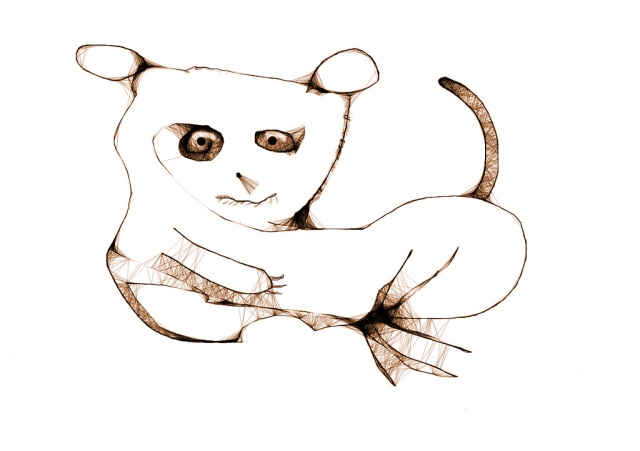
((See you on the other side!!))

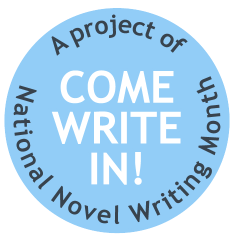 Come Write In This November in Celebration of National Novel Writing Month 2016!
Come Write In This November in Celebration of National Novel Writing Month 2016!
National Novel Writing Month (NaNoWriMo) is a fun, seat-of-your-pants approach to creative writing. On November 1, participants begin working towards the goal of writing a 50,000-word novel by 11:59 PM on November 30. Valuing enthusiasm, determination, and a deadline, NaNoWriMo is for anyone who has ever thought about writing a novel.
Join us, STL literati, and fellow Wrimos at Central Library each Saturday in November, 2-5 p.m., for writing games, word sprints, a contest, and a weekly wordsmithing seminar. Week one, we’ll convene in the first floor Book Club Room, then the second floor Training Room weeks two through four.
We’ll supply the caffeine. You supply the story!
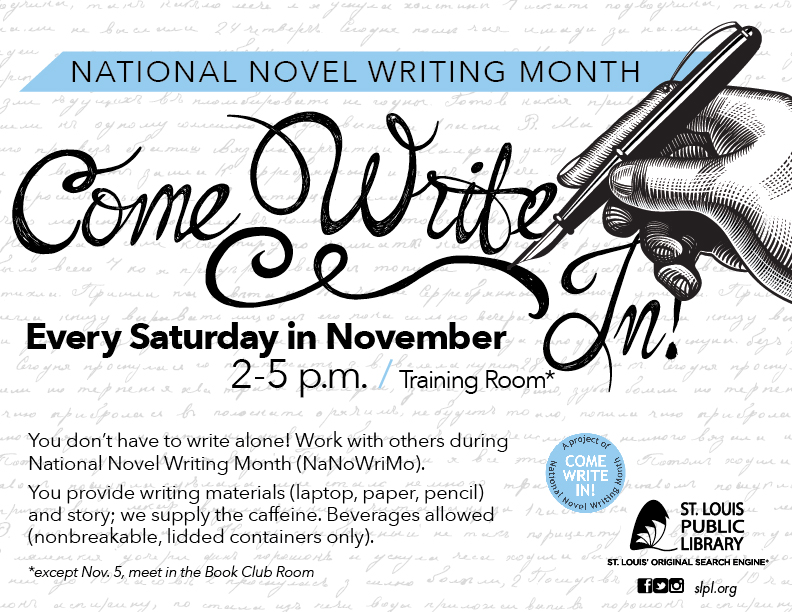
In the meantime, it wouldn’t be a bad idea to check out upcoming NaNoWriMo prep sessions in the area:
Mon, October 17, 6:30pm – 8:00pm: Ferguson Municipal Public Library (TODAY!)
Tue, October 18, 7pm – 9pm: Mid-County County Library
Tue, October 18, 7pm – 9pm: Maplewood Public Library (yes, there are two on the same evening! take your pick)
Mon, October 24, 6:30pm – 8:30pm: Indian Trails County Library
Tue, October 25, 7pm – 9pm: Maplewood Public Library
Wed, October 26, 7pm – 9pm: Samuel C. Sachs County Library
Sign up to begin writing and word-counting here, and RSVP for the regional kick-off party on October 22 here!
I’m skeptical.
I scan the library’s shelves for the telltale spine typography of the self-published and I’m skeptical. I Google their print-on-demanders and their price packages and I’m skeptical. I flip through their pages, a veritable collage of design and editorial missteps, and I’m skeptical. These Indie Author Day people and their glittery SELF-e marketing scheme give me the heebie-jeebies and I think this whole self-publishing industry must be filled with vampires who prey on uninformed wannabe writers’ disposable incomes, and I’m skeptical, guys. I’m also an introvert, and so I tend to think not speaking –and by extension, not publishing — is kind of a plus in a world full of information static. And I’m a perfectionist: if what you’re saying isn’t the cream of the mainstream crop, to be lauded and validated by the best and brightest, why bother saying it at all?
BUT — Let’s acknowledge that I’ve been an avid consumer of publishing powerhouses’ little cash cows since my eyes could focus, and I’ve worked in publishing, and I was an English major, and I’ve participated in my fair share of writing w orkshops. I’m indoctrinated. And I hold that indoctrination dear because I’ve paid (and continue to pay) a lot of money for it, and it makes me feel smart.
orkshops. I’m indoctrinated. And I hold that indoctrination dear because I’ve paid (and continue to pay) a lot of money for it, and it makes me feel smart.
AND — Let’s consider for a moment the revolutionary potential of the self-publishing enterprise. How much of mainstream publishers’ stuff is really all that good? Since it’s been fed through a finishing machine, it’s somehow worthwhile/true/lasting? Eh… no. It just makes for an attractive product. And with so many hands in the mix, stretching and trimming until all is palatable and correct, how can a voice shine true? How can the traditionally unpalatable and the traditionally incorrect ever win?
I confess I haven’t yet had much enthusiasm for this Indie Author Day event. For one, I worried it would mean joining the vampire legion, leading the library’s group of writers astray. Mostly, though, my gut impulse was to silence these writers — I think, because I’ve been trained to think, that if the bigwigs aren’t interested, then there ain’t really any interest to be had. So quit. Or at least quit trying for an audience. Write in private the same way you poop in private — take a few bites of that postlapsarian shame cake!
Friends, this is the selfsame crap my brain whines at me whenever I try to do anything. I hear it so much in my own head that I apply it to other people. And these other people tend to mill about on the margins already, so what gives me the right to further marginalize them — and myself? That makes me The Man’s proxy, and that’s, like, just what The Man wants.
Anyway. This rambling is all to introduce an evidently enlightening article from Lit Hub’s M. Sophia Newman, “How a Self-Published Writer of Gay Erotica Beat Sci-Fi’s Sad Puppies at Their Own Game”. It threw into question my whole outlook on the situation, and I hope it does yours, too.
An excerpt:
Question: If you could pick a single writer to make an effective, compassionate statement about identity politics to a divided literary community, who would you pick? Would it be a schizophrenic, autistic person who’d authored an e-book called Space Raptor Butt Invasion?
…
Despite the unselfconscious strangeness of [Chuck Tingle’s] writing style and a lack of what fancy-pants literary types might call “talent,” his work is lighthearted, good-natured, and hilarious. He’s timely and in touch with the American cultural milieu. He clearly embodies the nondiscriminatory mindset that science fiction and fantasy types now seem to favor.
And he’s prolific. Whatever else he might be doing, Chuck Tingle clearly applies the seat of his pants to a chair each day and puts words on the page, unfettered by what other people might think.
I envy him. I admire him. And although my writing is very different from his, I’ve begun to self-consciously emulate his work ethic. To me, he’s been an unexpected jolt of energy at the last possible moment, and a good example to follow forever after—just as the elves were to the shoemaker.
I invite you to come to the library’s Indie Author Day panel this Saturday. Watch as I attempt to shed my many layers of privilege, low self-esteem, and indoctrinated skepticism! And meet a few cool writers who’ve been-there-done-that in the process. We have much to learn from them.
What with Barnes & Noble’s recent decision to take the plunge and stock self-published content, it would appear the indie book industry is on the rise, right? There are the proverbial success stories: Fifty Shades of Grey, The Martian. But content aside, it’s often even tougher for the self-published to pass muster cover-wise. Peek into one writer’s experiment with selecting the often — questionable? — graphic design that packages independent titles:
What a $5 Book Cover Looks Like
Peter Derk’s takeaways:
1. If the seller doesn’t ask you a good number of questions, forget it. If all they wanna know is your name and the book’s title, then they probably won’t deliver something of quality. If they ask about the dimensions of the book, font preferences, and if they ask for attached images that show the kinds of things you like, you’ve found a good seller.
2. I wish I’d identified two sellers I liked and spent my $37 on them, using the extra cash to buy more revisions or other services, rather than spreading the money so thin. I’d be happier with the results, and I’d rather my money had gone to paying people who did a good job.
3. If I’d known I might spend a total of $75 for a finished product that I had the rights to, I would have looked into some other graphic designers to see what $75-$100 would get me. When the price is $5, it’s hard to ask other graphic designers to do anything. But when the price is $75, I think there’s more room to talk to someone without being insulting.
May Derk’s $37 dollars benefit you and yours, too! And speaking of self-publishing, don’t forget to join us at Central Library this Saturday for our first annual Indie Author Day celebration — we’ll hear first-hand reports from those in our local St. Louis indie authorship trenches!
Scribblers,
Please forgive the hiatus — as I’m sure many of you know by now, the STL Scribblers group has changed hands since founder Eric Lundgren moved out east. I’m the new facilitator, Lainie Formby, and I’m happy to have been asked to join such a welcoming community of writers!
I have some activities planned this fall that I’m eager to share, the first coming up in just over a week:
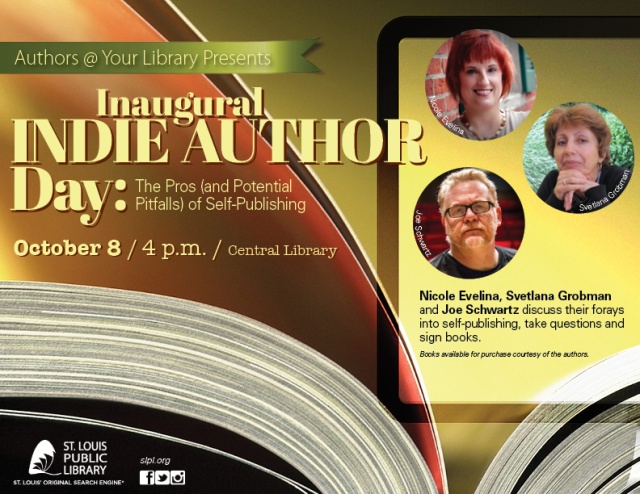
SLPL is excited to join over 200 other libraries across North America in celebration of Indie Author Day, an event designed to bring local writing communities together to participate in author panels, book readings and signings, workshops, presentations, and more.
Central Library presents The Pros (and Potential Pitfalls) of Self-Publishing, a panel of Missouri-based authors at the ready to talk independent authorship. Join St. Louis local Nicole Evelina (Daughter of Destiny, Been Searching for You), Svetlana Grobman of Columbia Public Library (The Education of a Traitor: A Memoir of Growing Up in Cold War Russia), and SLPL’s own Joe Schwartz (The Games Men Play, Ladies and Gentlemen: Adam Wolf and the Cook Brothers) as they detail their forays into self-publishing, take questions, and sign books Saturday, October 8th! Light refreshments will be served.
Then, be sure to stop by Central again one week later — Saturday, October 15th — for the third annual St. Louis Small Press Expo. Learn more here. #STLSPEx16
In the meantime, keep an eye on this page for indie authorship content in the days leading up to the panel!
Questions, concerns, or suggestions for Scribblers going forward? Email (eformby@slpl.org), call (314-539-0396), or come to the next STL Scribblers meeting on Wednesday, October 19th. We love new stories, and new faces!
In June, the STL Scribblers held a Transformation Microprose Contest, challenging writers to produce a 800-word piece on the theme. J.D. Campbell’s “Looking Through Glass,” a powerful piece on justice and empathy, is the second of three winners, selected by democratic vote. It is published here for the first time.

Looking Through Glass
Joyce Canter watched Jamal through the one-way glass as the boy sat shackled to the interrogation room table. Tears burned his eyes. The law mandated a minor’s parent to be present during questioning, but that would prove difficult since Jamal’s parents lay dead in their living room.
“Book him,” Joyce said.
Lieutenant Daniel Haden cocked his head. “Ms. Canter, the evidence isn’t that clear.”
Annoyed, she turned and faced the Lieutenant. “Two dead parents aren’t clear enough for you?”
The Lieutenant frowned. This wasn’t the first time he and the district attorney had butted heads. “Both Jamal’s and his father’s prints were found on the gun. Self-defense is plausible.”
“So is murder.”
The Lieutenant took a deep breath and said, “Three domestic disturbance calls in the past six months, all from Jamal.”
Joyce quit listening to the Lieutenant. There was no need. She knew Jamal’s guilt the moment she looked through the glass. The eyes of cold blooded killers spoke to Joyce Canter like hymns to angels. They may well up with tears and plead their innocence, or even dilate remorse, but the eyes never lied to her.
She had first become aware of “the gift” while clerking for Judge Thayler as a law student. One glimpse into the eyes of a courtroom criminal was like truth serum, a confession of sorts, which shot an electrical sensation throughout Joyce’s body. The gift was never wrong and Joyce always sided with it over any counterintuitive evidence.
Joyce looked at Jamal again through the glass. “He’s a killer, Lieutenant. A fifteen year old stone cold killer.”
“I would never question your–”
“Then don’t!” Joyce interrupted.
Joyce did not understand the Lieutenant’s empathy. Even when her husband was murdered four years ago, the Lieutenant had handed out compassion cupcakes to every suspect he interrogated. Pointless Joyce thought.
“At least hear his side of the story,” the Lieutenant pleaded now.
“No. I’m late to pick up my son.” Joyce walked to the door but before leaving she added, “The truth will prevail Lieutenant; it always does.”
Moments later, she arrived at Ethan’s school. The Wonder World Preschool decor provoked a degree of imagination long forgotten by Joyce. Cartoon animals covered the walls. Sea lions swam in blue oceans which transformed into green fields peppered with black cows.
Entering the school, Joyce was met by its director, Susan Landers, and escorted into an observation room. In stark contrast to the hallway, this room was cold, colorless, and void of personality. A one-way glass window peeked into an adjacent room where Ethan sat alone drawing at a table.
Confused, Joyce asked, “What’s happening? Why is Ethan by himself?”
“Ms. Canter,” Susan chose her words carefully, “Have you noticed a difference in Ethan’s behavior? Anything out of the ordinary, or say abnormal?”
Abnormal.
The word was still registering for Joyce when Susan produced crayon drawings from a folder and handed them to her. One picture showed a stick person holding a knife dripping with red blood. The victim, labelled Victoria, lay covered in a pool of red. Etched below the knifeman was the name Ethan.
Joyce gasped.
The next drawing showed a boy having his hands sawed off by Ethan. Another painted a gruesome mass killing of his classmates. The last showed a closeup of the knife plunged into his teacher’s eye.
In every drawing, Ethan’s stick figure wore a satisfied smile.
Joyce could barely speak. “I don’t understand.”
Susan Landers took a deep breath. “The children were asked to draw a picture of something they knew how to do, like pickup their room or brush their teeth. Ethan told his teacher this is how you kill someone.”
The drawings slipped through Joyce’s fingers and floated to the floor like falling autumn leaves. She peered through the glass and connected with her son’s eyes. The moment was brief, but the sensation freight-trained her, nearly knocking her over.
“I need to see my son now!” Joyce said, pushing past Susan and entering the classroom.
“MOMMY,” Ethan yelled and ran into his mother’s outstretched arms. His little beating breaths resonated as she held him close, consumed by his pure unadulterated love. “I missed you Mommy,” Ethan said, kissing her cheek.
Joyce sobbed uncontrollably as she carried Ethan to his carseat.
Driving home, she looked at Ethan in the rearview mirror, coming to grips with her son’s true identity, feeling her gift was now an affliction and not a blessed power. For the first time she realized there was a human being, a loving soul, connected to the image she viewed through the glass. Wiping away the tears, she dialed the Lieutenant, hoping there was still time to hear Jamal’s side of the story.
*
After graduating from the University of Iowa, J.D. began a career in advertising by writing, producing, and selling radio commercials. He currently owns Campbell Creative Media, a creative, marketing, and consultation agency.
In his free time, J.D. dabbles in the dark waters of fiction, recently winning 1st place in the 2015 St. Louis Writer’s Guild annual short story contest.
J.D. resides in St. Louis, Missouri with his wife, three daughters, and a finicky Australian Shepherd named Mazie.
In June, the STL Scribblers held a Transformation Microprose Contest, challenging writers to produce an 800-word piece inspired by the theme. Jan Kraus’s “Her First,” a stark and lyrical account of a love affair, is the first of our three winners, selected by democratic vote. We are very honored to publish it here.

Her First
When I fell in love the first time, it was absolute; his hands, his eyes, his voice, his mind, his spirit. It snuck up on both of us.
It was my first full time job, civil service, and Martin was my boss. The war raged in Vietnam. Our team had ‘secret’ clearance and secured entry doors. Martin and I sat in a tiny room, my desk sideways to his. There was a little window pass through to Fred, the parts guy, and a door that the twelve crewmen used when they walked by on their way to the vault and workshop in back. As the first admin they’d ever had, the only female and very young, I think they all fell in love with me a little and I with them.
“Where’s Martin?” asked an unhappy female voice on the phone.
“He’s away. Can I take a message?”
“He needs to call Addy!” Slam.
I complained “She was NOT very nice”.
With a grin, he said “Well, that’s no lady, that’s my wife.”
Martin was married with sons my age; tall, strong, agile, one fourth Cherokee with a chiseled face someone once called ugly. He’d been US army, retired into civil service, a soldier-philosopher, serene, unflappable, and, unexpectedly, a part-time rare coin merchant.
In spite of the war, it was government work, so we had plenty of time for conversation, familiarity, and a surprising empathy to mature. Soon, I didn’t need to see him to know he was in a room.
The power of the feelings that grew alarmed us. We didn’t want to hurt Addy. We didn’t want to lose the respect of our friends and colleagues. It was bittersweet, wretched and so damn real.
I quit my job to put an end to it.
He entreated “Just lunch? Please…?”
My feeble resolve crumbled. We’d meet at a little out of the way place on the edge of downtown; formica table tops, patchy linoleum floors, florescent lights. He’d bring Herb, one of the crewmen, so we were just friends who stayed in touch; except, perhaps, when our hands brushed or we stood too close.
This went on for months, until one day he asked softly. “Meet me by the river?”
The wharf was dark and strangely quiet, sounds softly muted echoes. Barges floated by. The river sparkled with reflected lights from traffic on the bridges and anchored boats. My eyes soaked him up as he’d walk to my car. The kisses, the caress, were sweet, salty and utterly terrifying. It was thoughtless yet every cell was conscious, awake at last.
We got bold and met in the daylight on the barren, secluded expanse below the bridge. Massive steel girders stood guard as we held each other, two old souls entwined at the wrong place, at the wrong time.
Life still happened. Vietnam wore on; boys I’d known gone or damaged. I lived with my parents and siblings. When my Mom died, my home life became agony. The stolen moments with Martin were my solace.
He’d talk about weekend events where he bought and sold coins. I’d drive those routes; visit towns where he’d stayed; have a meal where he’d dined; seek his aura left behind.
He insisted I start night school to get my degree. I’d been drifting without a goal and he wouldn’t have it. Thus, my life’s work and independence were set in motion.
He confessed. “If I could choose, it would be you. I want a family with you.” Calamity loomed.
Winter came. “Addy and I are moving to Phoenix. You know I hate these cold bleak months.” Yes, I knew.
It was the only way, so right and so devastating.
I whispered, “You’ve got to be the one.”
We met one night at a wayside motel in a distant little town. The vacancy sign blinked outside the window; the room out of an old black and white movie. We were both so frightened. His hands shook. I remember only bits and pieces of our coupling; just the brief pain and the sweetness of his touch.
Our meets grew further and further apart, a slow agonizing parting but the only way we could remain deeply and profoundly joined.
It he’d been single; if I’d been older; if only, if only…. It just couldn’t be.
The last time I saw him, I was moving into my first apartment, he was on one last trip back from Phoenix. His car out front, my roommate Nancy asked “Who’s that?”
I couldn’t say “My other self.” So I said “A friend from work.”
Down on the curb, I leaned into the car window His hand on mine burned like fire. His eyes were full of me. I hope he saw himself fill mine.
Jan Kraus has been writing for many years, but pursuing a career in Information Technology kind of got in the way. For her final career based project in 2012-2014, she authored several modules in the open access Health Information Technology course funded by the MoHealthWINs grant program in conjunction with Stanford University, Carnegie Mellon University and the Bill Gates foundation.
Jan’s now pursuing the arts, including writing poetry and fiction which is definitely more fun.
photo credit: <a href=”http://www.flickr.com/photos/118292762@N02/27447930916″>The Humber Bridge</a> via <a href=”http://photopin.com”>photopin</a> <a href=”https://creativecommons.org/licenses/by-nc-nd/2.0/”>(license)</a>
Central Library’s poet-in-residence Ted Mathys reports from Special Collections, where he is exploring the William Marion Reedy Archive. This is the fourth in a series; see below for previous entries. In the Stacks is a collaboration between the St. Louis Public Library and Coffee House Press: the program (founded by Coffee House in 2014) connects local authors with libraries and encourages artists and the general public to think of libraries as creative spaces.
It’s hard, living in St. Louis, to not feel the historical pull of the year 1904. It marked our city’s coming out party. During that single summer, St. Louis played host to the Louisiana Purchase Exposition, otherwise known as the World’s Fair, as well as the 1904 Olympics and the 1904 Democratic National Convention.
Today, the World’s Fair legacy is everywhere. Most palpably it is felt in Forest Park, the site of the Fair. Twice as large as Central Park in New York, and four times the size of Grant Park in Chicago, the park accommodated 20 million people at the Fair during 1904. The fountains and grounds where the Fair was held are now the site of the St. Louis Art Museum. In the park there’s also the Missouri History Museum, which has a permanent exhibit about the Fair, as well as the St. Louis Zoo, the St. Louis Science Center, the World’s Fair Pavilion, restaurants, an 18-hole golf course, tennis courts, ball fields, horse stables, an ice skating rink, and gobs of geese.

But the legacy of the Fair also indexes aspects of St. Louis identity. Like, we here in St. Louis were once the center of the world, and now we’re not sure what we are, but damn, look at those amazing trees and serpentine gravel paths and fountains and architecture. If you look in the right direction, doesn’t it just feel like Paris? The Exposition was also largely a celebration of conquest and racial exceptionalism, issues that haunt the city today. The Fair came in the wake of the Spanish-American war in which the U.S. had acquired new territories in Puerto Rico, Guam, and elsewhere. People from these areas, as well as Native Americans and indigenous peoples from the Philippines where literally put on display at the Fair. Finally, the Fair lives on in kitsch. For example, there’s an amazing little hole-in-the-wall donut shop that I visit at the end of each semester to get donuts for my students to bribe them into thinking I’m a good teacher. It’s called World’s Fair Donuts. The address is, appropriately, 1904 Vandeventer Avenue. And yes, of course, there’s Judy Garland as Esther Smith in Meet Me in St. Louis, which takes place in the lead up to the World’s Fair, and has given us standards like the “Trolley Song.”
The Internet also tells me I can now buy an incredible Judy Garland doll donning her trolley dress.
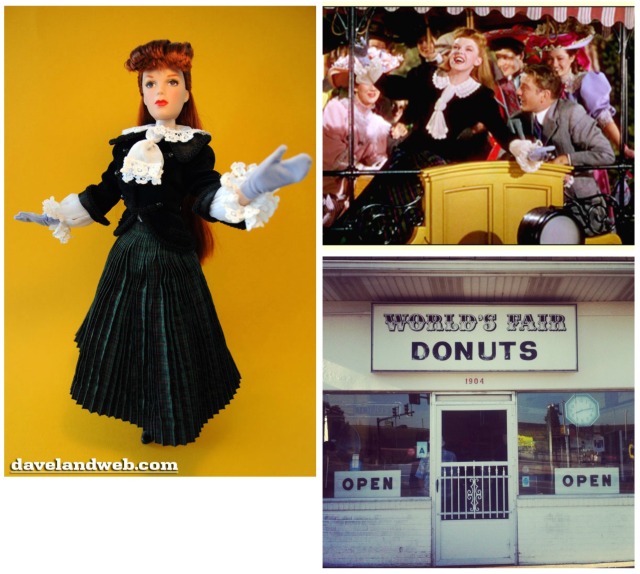
But, as with Ted Drewes Frozen Custard and toasted ravioli and slimy provel cheese on St. Louis cracker crust pizza, I’m never sure if I’m supposed to be proud of the Fair. Turns out this is nothing new. It’s a question about St. Louis’ identity as a provincial city or a national city, an outpost or a center. And it’s further a question about citizen humility vs. citizen self-regard and ambition. This is what Reedy wrestled with in The Mirror during 1904.
In the New Years Eve issue in 1903, Reedy pontificates on the coming year. Writing about the Fair, he wonders about the city’s residents’ flatlining enthusiasm: “What shall we say of it that shall avoid the mere hyperbole of patriotic booming? It will be the greatest Exposition of all history: that is vague. There have been already expended upon it $30,000,000….[But] to us here in St. Louis, perhaps the Fair doesn’t wear its true proportions.” Reedy feels that despite its magnificence, the locals have been working for so long to land the Fair, raising money for the Fair, preparing for the Fair, and thinking about the Fair, that they’ve forgotten that St. Louis is about to do something of global significance. He mocks how St. Louisans think of the local leaders who helped secure and bankroll the events as just guys down the street: “Dave Francis is a big man? Pshaw! We see him every day. We even take a drink with him. We don’t see any halo around him. He’s much the same sort of man he was when we knew him only as a citizen. He a man of genius? Go on! He’s only a slob of a St. Louisan like the rest of us.” For Reedy, this line of thinking is the problem. “That’s the essential slobbiness of sentiment that has kept the St. Louisan of worth always in the slob class – in his own town.” Reedy wants his city to act like a world city, to have some self-regard.
As the Fair approaches, Reedy ramps up his boosterism. “The Fair opening is only four months away,” he writes. “The old town isn’t in the least excited.” Having struck out in his attempts to whip up excitement, he then tries an about face, half satirically and half earnestly suggesting that St. Louisans aren’t excited precisely because they are not provincial bumpkins but mature cosmopolitans: “We are only acting as cosmopolitans. This is a big city and the World’s Fair isn’t anything more than an unusually large and pretty bazaar or picnic held in an outlying wood…We are not like Kansas City, that turns out en masse to a flower show or a horse show or a cattle show. St. Louis is Cosmopolis. It has all the sang froid of Cosmopolis. It has acquired an “imperturbable aplomb.’…As was written of India, so of us it shall be said: “She heard the legions thunder past, then turned to dream again.”
By February he’s grumpy. He’s worried that construction on a new railway terminal to transport people to the Fair is behind schedule. He uses the fair to highlight corruption again, this time focusing on how “Lindell avenue, the main boulevard to the World’s Fair, is to be paved with bituminous macadam. Now bituminous macadam in St. Louis is a rank monopoly….But Lindell Avenue had to be paved for the Fair, and the Board of Public Improvement would have nothing but the Warren Brothers’ material, and “there you are.”” And he inveighs against local barbers who are preparing for the coming influx of visitors by jacking up prices: “Barbers about the St. Louis Union Station will make whiskers popular with World’s Fair visitors, if they keep up the present rates of $2 per have and $6.25 for a hair cut…The robbery of visitors to the Fair should be punished as severely as the laws permit.”
But by early April he’s excited, as is everyone else, and his pride is palpable. His reflection on April 28th, right before the opening, reads in its entirety: “Even the mighty Mississippi rises thirty-five feet above its banks to do honor to greatest World’s Fair in history.”
Reedy writes on the Fair throughout the rest of the year, though he seems more interested in and writes more frequently about the Democratic National Convention in St. Louis and the meatpacking strikes in Chicago that would be later immortalized in Upton Sinclair’s The Jungle. About the Fair, he’s consistently celebratory, working to convince the locals that what they’ve done is great. He pillories national and international newspapers that have attacked the Fair for early sluggish attendance and for the “recklessness with which the critics set about to knock the city.” By the time the Fair attendance turns the corner and the year winds down, Reedy seems sure that the Fair will go down in history, and he’s right. In the end his verdict is: “World’s Fair a Winner.”